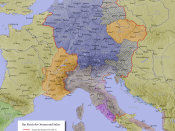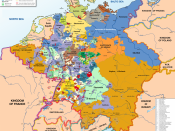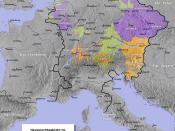On October 24, 1648 in Munster a treaty was signed that ended one of the most bloody wars in European history. This war, a war of religion, involved most of Western Europe, especially the Holy Roman Empire. The Thirty Years' War marked the decline socially, politically, and economically of the Hapsburgs and the rise of France as the chief power in Europe.
As a result of the Thirty Years' War, the Hapsburgs lost their standing as the wealthiest dynasty in Europe. The war was an economic drain on the empire, due to increased cost of arms and men. After the Hapsburgs Catholic league army was defeated in 1632 by the Swedes the Hapsburgs only hope for victory was to resort to the uses of mercenaries, a factor that contributed to further economic decline. The Holy Roman Empire then had to depend on soldiers of fortune for the remaining 16 years of the war.
These mercenaries were out of control. The mercenaries were almost worse then the invaders. The mercenaries would loot the cities that they were supposed to be protecting because they needed the supplies. The commanders of the mercenaries could not control them and in some cases they would even help with the looting. With the Holy Roman Empire's defeat the country lay in shambles. No less then half of the German people perished during the war. Two thirds of all of the industrial, agricultural, and commercial facilities were ruined. With its entire economic structure destroyed and half of its workers killed, the Holy Roman Empire had to resort to outside sources to import the goods that the Holy Roman Empire needed to survive. This condition contributed to an unfavorable balance of trade. This trade deficit forced the Hapsburg to use the wealth acquired in the...


